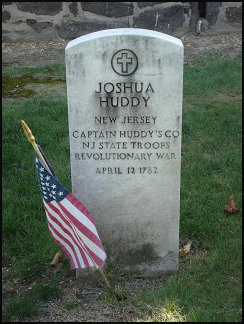In 1836, Huddy’s surviving daughter, Martha Piatt, wrote to Congress that the nation had never expressed its gratitude to Huddy and asked for money and land for herself and her late sister’s children. On February 14, 1837, a special committee of Congress, which included representatives from New Jersey and Ohio, issued a report calling for Congress to resolve that it held “in high estimate and grateful remembrance the service of Captain Joshua Huddy” and to pass a bill entitling “the legal representatives of Joshua Huddy” to 300 acres and $1200. In many antiquarian accounts, the story ends with that happy ending – Piatt vindicated, Huddy remembered, justice restored. The reality, however, was far less inspiring. Inexplicably, the committee’s recommendations languished in limbo, and the bill apparently expired. After 1854, Piatt’s name disappears from congressional records; evidently she never received any compensation. Huddy was largely forgotten until the Bicentennial Celebration in the 1970s renewed interest in Monmouth County’s fascinating history during the Revolutionary War.
Documents reveal Huddy to be in some ways a prototypical, red-blooded American whose last years were marked by violent episodes. The records indicate that he was certainly strong, courageous, and willing to fight for the Patriot cause. He also was ambitious and willing to take risks to get ahead financially, as seen by his property losses in Salem (for unknown reasons, but probably as a result of risky investments or overspending), his marriages to two widows, his seizure of Loyalist property, and his commission as a privateer. Huddy’s expulsion from the Quakers and his court appearances, especially the occasion prompted by his attempt to sell his second wife’s property and kick her children out of the house, indicate that he was hardly a saint. He seems to have been a rough-and-tumble type of character,
endearing to his friends and respected by his enemies-a man hardly suitable as a member of the Quakers. The only documented quote by Huddy-in prison shortly before his death, he boasted to his captors about his role in hanging Stephen Edwards-suggests his forthright personality and confidence, as well as perhaps a fatal flaw in not weighing the consequences of his actions and words.
Huddy’s story is a reminder that the Revolutionary War continued in Monmouth as a civil war for many months after the armies stopped fighting. Patriots and Loyalists continued to attack each other, in part to retaliate for previous killings. Huddy’s death, in fact, was one of the last that occurred before the Treaty of Paris in 1783. By dying, he became a hero and secured William Franklin’s reputation as a villain. In the larger scope of history, Huddy’s death was a tragic example of a regrettable and continuing pattern of extralegal acts of revenge that nurture enduring enmities.
Huddy’s final resting place is in an unknown location on the grounds of the Old Tennent Churchyard.
Sources:
Saretzky, Gary D. (2004). THE JOSHUA HUDDY ERA: Documents of the American Revolution. Catalog of the Exhibition at Monmouth County Library Headquarters, Manalapan, N.J. October, 2004; Revised November 2004. Produced by the Monmouth County Archives. Available: https://www.monmouthcountyclerk.com/archives/events-exhibits/2004-documents-of-the-american-revolution-joshua-huddy-era/
Image: Cenotaph for Joshua Huddy. Photo by Lindsey40186. Created: 19 June 2004. Used under terms of Creative Commons.


Leave a Reply